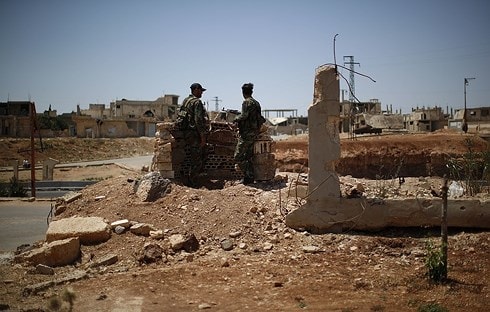Türkiye and the “headache” called Idlib
Observers say the possibility of a large-scale conflict in Syria's Idlib province is really giving Turkish officials a headache.
Ankara is focusing on solving many problems at the same time.Syriaespecially in the context of events that are not going "as Türkiye would like", according to President Erdogan. One of the issues that Ankara is very concerned about is Idlib - where "anything can happen and at any time", according to Mr. Erdogan.
|
| Syrian Army soldiers. Illustration photo: AP. |
Last week, Syrian President Bashar Al-Assad once again spoke out, saying that the provinceIdlib- The last major area currently controlled by opposition forces will be the next target of the Syrian army.
“Now Idlib is our target, but not only Idlib,” Assad told Russian media. His statement was widely seen as a reference to rebel-held areas in eastern Syria, but Idlib remains a priority for the Assad regime.
“The army will take into account their decisions, their priorities, and Idlib is one of these priorities,” Mr. Assad stressed.
Before leaving for South Africa to attend the BRICS summit last week, Mr Erdogan told reporters in Ankara that he would discuss the issue with Russian President Vladimir Putin in Johannesburg.
Türkiye deployed monitoring units in the Idlib de-escalation zone earlier this year under an agreement reached by Russia, Türkiye and Iran last year in Astana, Kazakhstan. The units’ mission, according to the Astana agreement, is to prevent clashes between opposition forces and the Syrian army.
Many believe the deployment is also part of Ankara's efforts to gain a military foothold in the region, aiming to ensure northern Syria is cleared of the Kurdish People's Protection Units (YPG), which Türkiye considers a terrorist organization.
Ankara is also closely watching what it says are preparations for a large-scale offensive on Idlib in the coming weeks, with the Turkish president warning that such a military operation could “completely destroy the Astana agreement.”
What worries Türkiye?
Türkiye fears an attack on Idlib would trigger a new influx of refugees as it awaits stability in the region so it can begin repatriating some of the 3.5 million Syrian refugees currently on its soil.
Ankara is looking to Moscow to prevent any attack on Idlib. However, this is said to be not simple because Russia considers Idlib a terrorist hotspot.
“The situation in Idlib is very complicated, it is the largest concentration of militants and terrorists,” Alexander Kinshchak, Russia’s ambassador to Damascus, told reporters recently.
“Exactly from this area [Idlib – ND], drones took off towards Khmeimim [Russian airbase near Latakia] and posed a real danger to us,” Mr. Kinshchak added.
Sedat Ergin, a leading foreign policy commentator for the Hurriyet daily, acknowledged that Türkiye was in a difficult position in Idlib but said Russia's position was equally complicated.
“President Putin cannot ignore Ankara’s demands because of Russia’s deep political and economic interests in Türkiye. Russia does not want to lose momentum in its relations with Turkey, but it also does not want Assad’s military to slow down on the battlefield. Turkey is going through a historic break with the West. Putin also wants to avoid steps that would push Ankara back into the West’s arms,” Ergin said.
According to Ergin, Moscow is seeking a delicate balance between Ankara and Damascus to resolve this impasse. However, the growing presence of extremist groups in Idlib, most notably Hayat Tahrir al-Sham (HTS), a rebel group whose members are largely former members of the Al-Nusra Front, has the potential to cause conflict between Ankara and Moscow.
Ercan Citlioglu, one of Türkiye's leading counter-terrorism experts, pointed out a few months ago the country's "dilemma" when it started deploying forces in the de-escalation zone in Idlib province.
“As Türkiye carries out its mission under the Astana Agreement to prevent conflict between the Syrian army and rebel forces, this also indirectly leads to conflict situations that HTS ‘benefits’,” Citlioglu commented.
Muharrem Sarikaya, a commentator for the Haberturk news portal, said last week that HTS “has started to become a problem again for Türkiye in recent days.”
Sarikaya pointed out that HTS attacked Syrian and Russian bases with rockets fired from areas near where Turkish forces were deployed. Sarikaya said that retaliatory artillery shells from Russian and Syrian positions fell near Turkish forces.
With the unpredictable developments in Syria, what happens in Idlib will certainly give Turkish officials a headache. Ankara does not want to get into more trouble when they have many other concerns in Syria, specifically the political direction of the Kurds in negotiations about the country's future with the Assad regime./.



.png)
